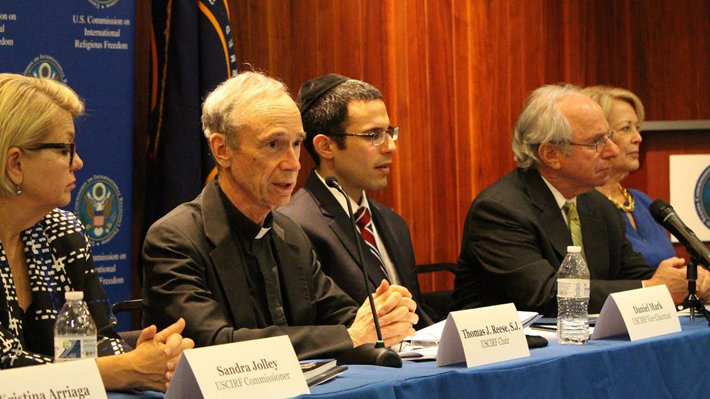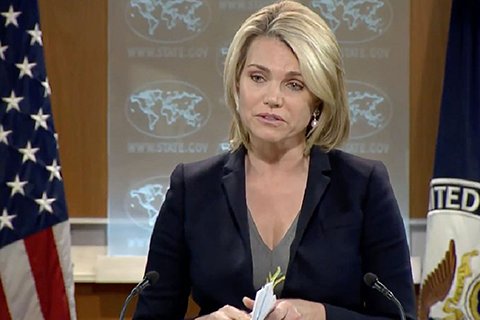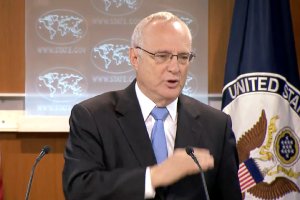Published November 16 in The Hill, the following excerpt from an opinion piece by the U.S. Commission on International Religious Freedom presents the Commission’s reasons for including Russia, Burma (Myanmar) and Pakistan on the list of Countries of Particular Concern (CPC)

Republished in full from The Hill
In our annual report, released in April, USCIRF recommended that 16 countries be designated CPCs: Burma, Central African Republic, China, Eritrea, Iran, Nigeria, North Korea, Pakistan, Russia, Saudi Arabia, Sudan, Syria, Tajikistan, Turkmenistan, Uzbekistan and Vietnam.
Unfortunately, since that time, there has been plenty more bad news to confirm the judgments on our list: Russia’s Supreme Court outlawed the Jehovah’s Witnesses, wiping out the legal existence of an entire religion; Rohingya Muslims are fleeing Burma in the hundreds of thousands as that country’s military leaders conduct what United Nations officials have described as ethnic cleansing; and Pakistan continues its persecution of the Ahmadiyya community, particularly through the use and abuse of blasphemy laws (including death sentences) that have no place in the 21st century.
Meanwhile, USCIRF commends the Trump administration’s nomination of Kansas Gov. Sam Brownback as ambassador-at-large for international religious freedom. If confirmed before the CPC designations are made, Gov. Brownback’s first priority should be to see all 16 countries designated as CPCs by the State Department.
For now, let us look at just three.
Russia: This year is the first time USCIRF ever recommended that Russia be designated as a CPC — one of the worst of the worst when it comes to religious freedom violations. We did not come to this conclusion lightly, and Russian actions since have only reinforced our position.
In outlawing the Jehovah’s Witnesses, Russia absurdly claimed that this pacifist, non-political group was a threat under Russia’s anti-extremism laws. The Witnesses can no longer proselytize, their organization’s property is subject to seizure, they face sanction for gathering to worship, and they now occupy a category of “extremists” with neo-Nazis and jihadists.
Another target of Russia’s attacks is Scientologists. After the Supreme Court ruling against the Witnesses, Russia’s Federal Security Bureau arrested, detained and interrogated five Scientologist leaders in St. Petersburg: Anastasiya Terentyeva, Sakhib Aliev, Ivan Matsytski, Galina Shurinova, and Konstantia Esaulkova. Alleging crimes related to “commercial activity,” these arrests make it clear the Supreme Court ruling against the Witnesses simply cleared the way for more harassment of minority groups.
Moreover, Russia has the dubious distinction of being a country that not only oppresses its religious minorities — it also exports such oppression, as is evidenced by the treatment of religious minorities in Russian-occupied Ukraine and Crimea.
Burma: Burma’s Rohingya Muslim population has been called the most persecuted religious minority in the world. Now that truth is being underlined — in ink throughout the world’s headlines and in blood on the earth, as more than half a million have fled for their lives. They flee burned villages and slaughtered families. They flee barefoot over barbed wire and landmines. Now is surely not the time for the U.S. to reverse its longstanding designation of Burma as a CPC.
Pakistan: A U.S. ally in counterterrorism yet also a supporter of extremism in many forms, Pakistan is a conundrum for U.S. policymakers. On religious freedom grounds, however, the issue is clear: Pakistan is among the world’s worst violators. Its blasphemy and anti-Ahmadiyya laws are indefensible, and, through acts of commission and omission, the government deserves blame for the virulence and violence against the Ahmadiyya community throughout Pakistani society.
And the Ahmadis are but one notable example of religious persecution in Pakistan. For years, the State Department has declined to take up our recommendation, but we believe that the new Trump administration will take a principled stand and finally designate Pakistan a CPC.
Also thanks, to new legislation, USCIRF recommended this year for the first time three non-state actors for designation as “entities of particular concern” (EPCs): the Islamic State of Iraq and Syria (ISIS) in Iraq and Syria; the Taliban in Afghanistan; and al-Shabaab in Somalia.
The administration does not need to make its designations of EPCs in November, but there is no time to waste. We look forward to working with the White House and the State Department on identifying EPCs and the tools to use against them.
For now, the administration can make a strong start in advancing international religious freedom by naming those 16 countries as countries of particular concern.
Opinion piece written by Daniel Mark and Sandra Jolley are, respectively, the chairman and vice chairwoman of the U.S. Commission on International Religious Freedom.
The significance of this designation is explained on the U.S. State Department website “In those cases where the Secretary of State designates a CPC, Congress is notified, and where non-economic policy options designed to bring about cessation of the particularly severe violations of religious freedom have reasonably been exhausted, an economic measure generally must be imposed.”
From its beginnings, the Church of Scientology has recognized that freedom of religion is a fundamental human right. In a world where conflicts are often traceable to intolerance of others’ religious beliefs and practices, the Church has, for more than fifty years, made the preservation of religious liberty an overriding concern.
From persecution of religious minorities to issues revolving around religious worship, beliefs, rites, expression, association, dress, symbols, education, registration and workplace discrimination, religious freedom issues have achieved a prominent place in global headlines.
The Church publishes this blog to help create a better understanding of the freedom of religion and belief and provide news on religious freedom and issues affecting this freedom around the world.


